|
|
 |
 |
 |
MIDI QUEST |
DETAILS |
COMPARE |
INSTRUMENTS AND MIDI DEVICES |
MIDI QUEST 13 UPGRADE |
MIDI QUEST 13 UPGRADE DETAILS |
| AVAILABLE NOW |
 Midi Quest 13
Midi Quest 13
The only editor/librarian software
ever rated '10' by Electronic Musician, Midi
Quest lets you take creative control of your MIDI hardware.
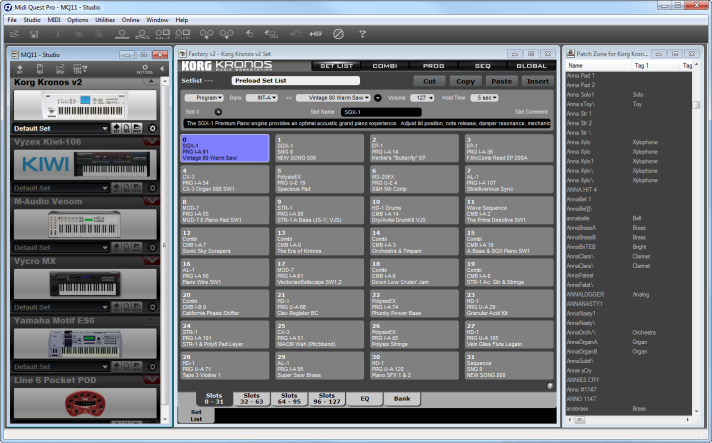
|
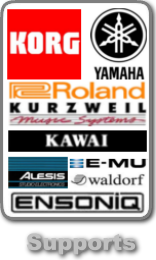 |
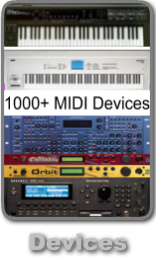 |
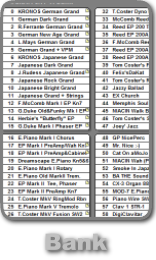 |
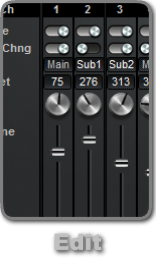 |
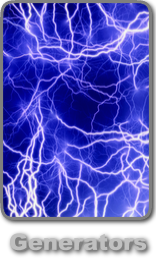 |
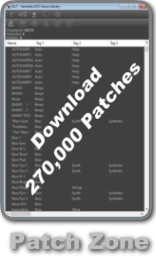 |
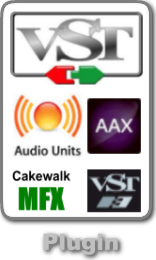 |
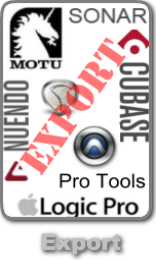 |
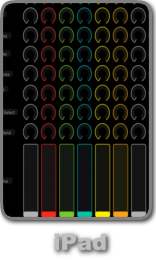 |
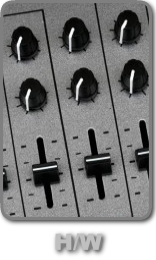 |
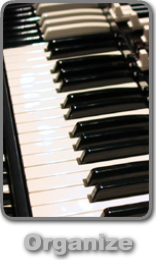 |
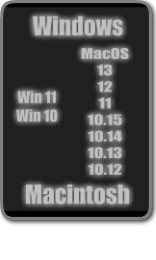 |
 |
Unparalleled MIDI Hardware Support...Midi Quest, the multi-instrument MIDI editor/librarian, is available in four versions: Midi Quest, Midi Quest Pro, Midi Quest Essentials, and Midi Quest one to complement your studio's requirements.Midi Quest supports over 1000 of the most popular MIDI hardware and instruments from 85+ different manufacturers including Korg, Roland, Yamaha, Sequential, Novation, Waldorf, Kurzweil, Alesis, Kawai, Akai, and E-mu. You can store, organize, and edit banks and the individual patches, combinations, multis, performances, drums settings, and other SysEx data loaded from your MIDI hardware. Midi Quest is a true multi-instrument editor/librarian designed from the ground up to effectively support multiple MIDI ports, multiple manufacturers, and multiple MIDI devices - including multiples of the same hardware. Midi Quest "talks" to each MIDI device individually so you can simultaneously send SysEx to as many as 250 different instruments and still edit another instrument - all at the same time. Try doing that with any other editor/librarian... |
|
|
|
 |
More Options for Your MIDI Hardware...Midi Quest is not a panel editor. Midi Quest is a professional, integrated system capable of fully managing, editing, and organizing the simplest to the most complex workstation class MIDI devices and hardware synthesizers such as Korg's flagship workstations, the Nautilus and Kronos.Midi Quest natively reads and writes industry standard .syx and .mid files so that you can easily take advantage of SysEx data downloaded from the internet or received from a friend. For Sound Diver users, Midi Quest Pro can import over 500 different types of SysEx directly from Sound Diver library files making it much easier to upgrade - when you decide to. If you have SysEx stored in Unisyn, Midi Quest Pro can import over over 280 different types of SysEx banks directly from UBK bank files so you can start using your SysEx faster in Midi Quest. Midi Quest can store an entire studio configuration for all of your instruments in a single file. You can then simultaneously open as many of these files as required - edit, copy between them, whatever you need to do. Try doing that with any other editor/librarian... |
|
|
|
 |
Bank Editing...First, what every editor/librarian should have (but may not)... Midi Quest will easily handle all of your bank editing tasks. Copy and Paste, Swap, or Insert single or multiple patches within the same bank or with other banks using menu commands or mouse drag and drop. Along with a dozen other standard commands to rename, sort, shift patches, and so on.1-click audition automatically sends selected patches to the MIDI device and auditions them so you can easily explore the sounds without having to download the entire bank to the instrument. Unlimited undo lets you easily recover from misadventures. Midi Quest's unique and powerful bank editing capabilities are highlighted in multi-timbral instruments with parent/child linked editing and display. Hover the mouse over any "parent" Multi/Combi/Performance and Midi Quest reports the "child" patches that are used. Hover the mouse over any "child" Patch and Midi Quest lists the "parents". Copy a "parent" Multi/Combi/Performance to another bank and Midi Quest automatically copies all of the necessary linked child patches as well. Rearrange "child" Patches and MQ automatically updates the parents to ensure that links remain valid. No hardware instrument is capable of this, no other editor/librarian does this - only Midi Quest. |
|
|
|
 |
Patch and Parameter Editing...Just like its bank editors, Midi Quest's parameter editors cover all of the basics with the features you expect - multiple ways to edit each parameter: grab and drag, direct numeric entry, incremental, mouse wheel, and extended popup editing. Unlike most panel editors, Midi Quest can retrieve and display all of the current values of all parameters. Of course, Midi Quest performs edits in real time so the instrument immediately reflects the changes made on screen. It also offers a range of both manual and automatic auditioning options.Unlimited undo lets you try variations and then select the best alternative. As always, it is the options that are unique to Midi Quest which are some of the most interesting. Use your MIDI keyboard to set note specific parameters. Use CC and NRPN messages to remote edit from your MIDI control surface. Have an iPad or iPhone? Use TouchOSC, Lemur, or any other application supporting OSC to control Midi Quest's editors (more information below). Record and playback edits as AU, VST3, VST2 and AAX automation. Finally, on Windows systems, Midi Quest supports multi-touch editing. Along with the editor's many features, you can take advantage of the Block Copy/Swap options which allow you to select a logical group of parameters such as an envelope, oscillator, effect, or LFO and copy/swap them within the same patch, a different patch, or to disk as a template for future use. Imagine creating a list of your favorite effect settings to access whenever they're needed. With more supported MIDI devices than any other editor, Midi Quest can simultaneously open as many different editors for as many different MIDI devices as you want - including multiple editors for the same instrument. |
|
|
|
 |
Patch Generators - Inspiration in seconds...Midi Quest is not just for the patch tweaker. Midi Quest has many users who have never created a new patch by editing individual parameters. Their secret is Midi Quest's five different patch generators which take existing sounds and combine them in different ways to create entire banks of new sounds in a matter of seconds. This type of experimentation, without Midi Quest, would require days but you'll get results in seconds. All you need to do is use Midi Quest's 1-click audition to listen to the new sounds and save the ones you like.If you're looking for inspiration, a variation on a sound you already like, or don't have time for a full editing session, Midi Quest's Patch Generators are the answer for you. |
|
|
|
 |
Get in the Zone, the Patch Zone...Looking for new inspiration? Looking for a sound but no time for programming? Midi Quest has the answer for you. Sound Quest's latest patch collection contains over 270,000 unique patches and is now accessible to everyone with Midi Quest 13 using the Patch Zone window. This context sensitive window tracks which instrument and type of SysEx you are working with and automatically lists the available patches. Editing a Korg Kronos Program? The Patch Zone will list over 30,000 available programs. A single click will audition the program on the instrument or drag and drop any program into a Bank, Collection, or Library for the future. Switch to a D-50 Patch editor and the Patch Zone will display over 14,400 patches for your consideration. Most patches are even tagged for sorting based on sound properties. This is another feature that is unique to Midi Quest. |
|
|
|
 |
The best way to integrate Your MIDI hardware with Your Studio's DAW....In May of 2000, Midi Quest redefined the way that editor/librarians are used by releasing the first VST and MFX editor/librarian plug-ins.Today, Midi Quest Pro is the only software to support every major DAW plug-in format including: AU, VST3, VST2, AAX, and MFX for all supported MIDI hardware. Each instrument plug-in operates identically to the stand-alone version of Midi Quest and features configurable Total Recall, CC/NRPN and AU/VST3/VST2/AAX parameter automation for instruments with parameter update messages, in-host bank and patch SysEx storage, and a parameter automation manager. Midi Quest Pro is the only MIDI editor plug-in to include vstxml files for Steinberg's Cubase, Nuendo, and Cubasis software to give you the best automation editing experience. |
|
|
|
 |
Your Instrument's Patch Names in Your DAWMidi Quest has always been the leader in MIDI hardware and DAW integration.In 1997, Midi Quest was the first software to automatically create Cakewalk compatible .ini files (in the days before SONAR, and even before Pro Audio) so that an instrument's patches could be selected by name instead of by number. Today, Midi Quest can export banks of patch names for virtually every professional DAW: Logic, Cubase, Sonar, Digital Performer, Pro Tools, Nuendo, Cubasis, Reaper, ACID, Ardour, Music Creator, and Powertracks. This includes creating multi-mode patch lists for workstation class instruments from Korg, Roland, Yamaha, Kurzweil, Kawai, and others. |
|
|
|
 |
Control Midi Quest from an iPad. Control Midi Quest from hardware. Control Midi Quest from...Patch and bank editors in Midi Quest 13 and Midi Quest 13 Pro can be controlled by any OSC enabled iPad or iPhone application such as TouchOSC or Lemur. Midi Quest is the only editor/librarian to support OSC.Use the tools provided by TouchOSC or Lemur (or any other OSC implemented control software/hardware) to create templates for controlling just about any aspect of Midi Quest editing. Sound Quest has already created over 250 templates that you can use as is or as a starting point to create your own. SysEx or CC message, it doesn't matter. You can even create a single template to simultaneously control or edit multiple instruments. All templates can be customized by TouchOSC and Lemur's development tools. At Sound Quest, we wanted to make using your iPad or iPhone with Midi Quest as easy as possible so we went one step further and created an OSC template editor for Midi Quest Pro. To create your own custom TouchOSC or Lemur templates, simply copy controls from a Midi Quest editor and paste them into the template editor, position them and export your new template for either application. Your new template is now ready to be transferred to the iPad or it can be further enhanced with their development tools. Midi Quest 13 Pro's template editor even offers you something that those for TouchOSC and Lemur don't - you can simultaneously open and edit any number of templates and freely copy controls between them. |
 |
And if you "only" have
one or multiple hardware control surfaces,
any control surface, you can also configure Midi Quest for remote
editing using both CC and NRPN messages. iPad or hardware? iPad or hardware? Its your choice. |
|
|
|
 |
Get Organized. Stay Organized...Yes, we know it's boring to talk about organization and integration but it's important.Have two or more MIDI instruments? With Midi Quest's multi-instrument environment, you can group SysEx from multiple instruments together in a single file. Imagine being able to save all of the SysEx required by all of your hardware for a song or gig in a single file so it's easy to find and setup. Midi Quest does it, others don't; and, with Midi Quest's multi-threaded design, you can simultaneously transmit SysEx data to each instrument for faster setup. Have, or plan to have, a large patch collection? Other editors don't offer a Library to store hundreds or even thousands of patches. Midi Quest does, and each patch can even be automatically or manually tagged with its own unique properties allowing you to quickly and effectively search for and find that particular sound when you need it in the future. |
|
|
|
 |
Invest in the future...For over 30 years, Sound Quest has pushed the boundaries of what MIDI hardware editor/librarians can and should be able to do for you. The result is software that is unequalled in capability and range of supported MIDI instruments and devices. Sound Quest believes in a "no synth left behind policy." This means that as new features are developed and added to Midi Quest, they are incorporated into the oldest of editors. In Midi Quest 13, editors for instruments that were released over 30 years ago have been updated and enhanced to maximize Midi Quest's effectiveness.Need more? Ask yourself, what does Sound Quest have in common with some of the biggest names in the industry: Korg, Roland, Yamaha, Alesis, M-Audio, Akai, Line 6, TC-Electronic, and TC-Helicon? The answer. All of these companies have chosen to supply editors to their customers using Midi Quest technology. From basic to advanced, just compare and you'll see that Midi Quest gives you unparalleled value. Questions? Please send us an email and we'll be happy to answer them. For Midi Quest version specific information, please visit the Midi Quest Details page or download Midi Quest today. |
Midi Quest 13 Order and Downloads |
||||
Windows |
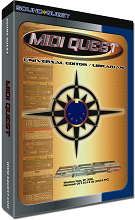 Purchase Midi Quest Upgrade Midi Quest Purchase MQ one |
Macintosh |
||
|
|
||||
| Download Midi Quest Demo | ||||